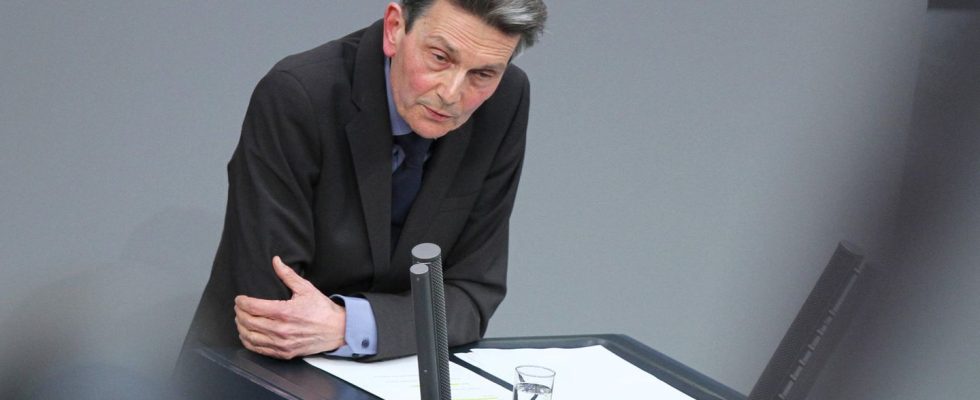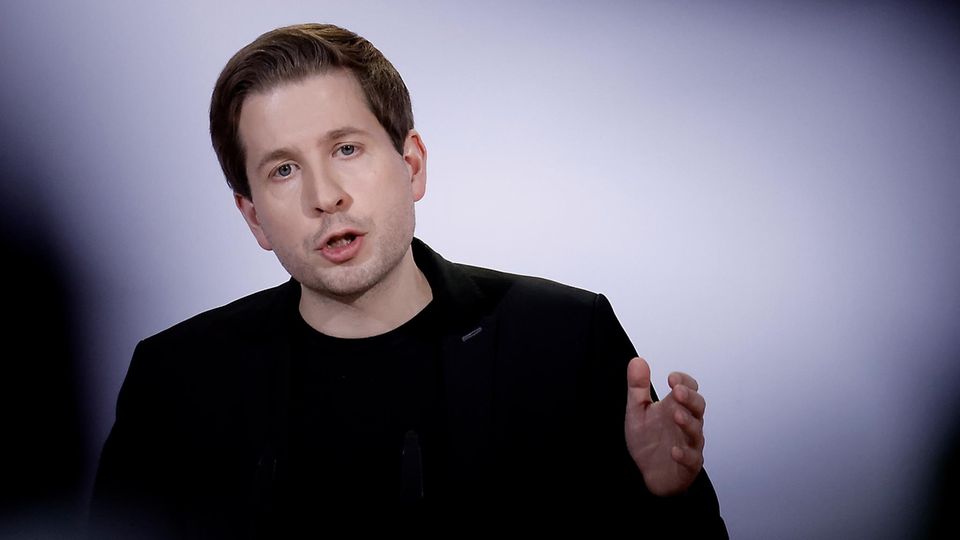The SPD parliamentary group leader suggests that we should at least think about “freezing” the war in Ukraine. Is this the new traffic light sound? Anyone who asks around will find out: probably not.
Rolf Mützenich had a lot on his mind when he took the floor under the Reichstag dome – and launched into a roundabout attack. Against the Union, which he accuses of having “selfish and base” political motives, but also against the coalition partners of the Greens and FDP, who have lost “some measure”.
Thursday morning in the Bundestag, weapons for Ukraine are being discussed again. Again about the annoying “T” word. And again about a chancellor who is supposedly cowering from the warmonger from the Kremlin. For the SPD parliamentary group leader, this falls short; he complains about a “small-scale debate”. He has a lot of faxes and a fixation on the delivery of individual weapon systems. In any case, Mützenich’s proposal can hardly be interpreted any other way, as it also shocks the coalition partners.
The opposition can definitely count this as their success. The Union has repeatedly failed in its attempt to force the delivery of the “Taurus” cruise missile to Ukraine through a vote in the Bundestag. But the CDU and CSU have revealed huge differences of opinion within the government factions. At times there was concern that Foreign Minister Annalena Baerbock from the Greens might suffer from dizziness because she shook her head so frequently. And not because of annoying statements from the opposition, but because of one or two statements from the SPD parliamentary group leader Mützenich.
He introduced a question into the debate that was tough. “Isn’t it time,” asked Mützenich at the lectern, “that we not only talk about how to wage a war, but also think about how we can freeze a war and end it later? Isn’t it also a political issue This question?”
Already. The chairman of the largest government faction suggests that we should at least think about “freezing” the war in Ukraine. Mützenich leaves it open in the Bundestag what he specifically means by this. But what the political scientist Mützenich, who did his doctorate on nuclear weapons-free zones and international politics, might have meant by this is revealed by an excursion into his field.
The Foreign Minister shook his head
A “frozen conflict” is a term from political science. To put it simply, researchers understand this to be a war in which the weapons are at rest, sometimes for a very long time. But it could “unfreeze” again at any time because there is no solution, no conditions for peace that both sides accept. Examples of this are the Korean conflict or the divided island of Cyprus in the Mediterranean.
And the Ukraine war was already there, that’s how Foreign Minister Baerbock sees it. On Friday, during the government press conference, her spokesman referred to a guest article that Baerbock wrote for the in December “Frankfurter Allgemeine Zeitung” had written. In this she contradicted the belief that a “freezing” of the war would mean a wintry peace. “Behind the front, in the occupied parts of Ukraine, where people are tortured, where children are abducted, there is no cold status quo that could be artificially preserved,” wrote Baerbock. “There is only the hot tyranny of Russia.” After all, Russia started its war in eastern Ukraine in 2014. This was then, to a certain extent, frozen by the Minsk process. Until it got hot again in February 2022.
In other words: Baerbock can only shake his head at the “freezing” of the Ukraine war.
The Greens are not alone in the traffic light coalition. “I am horrified that Rolf Mützenich is seriously suggesting that the war in Ukraine be frozen,” said FDP defense politician Marie-Agnes Strack-Zimmermann star. “Frozen manure remains manure even after it thaws.” If Mützenich, who in his role speaks for the entire SPD parliamentary group, seriously calls for a freeze on the war in Ukraine, then “the Chancellor’s SPD party will obviously move away from the agreed turnaround.” This is unacceptable and must be clarified “as quickly as possible” in the coalition.
Does the SPD parliamentary group share the opinion of its chairman? Or did Mützenich rush into his thoughts in the heat of the argument?
If you ask party leftist Ralf Stegner, who also supports more diplomatic initiatives during the war, the faction leader’s statements are hyped up. A “freezing” of the war could also mean a gradual ceasefire, which Ukraine would have to decide on. “No one expects them to surrender or give up occupied territories,” he told the star. The traffic light did not decide this in the Bundestag, nor did Mützenich demand this.
Mützenich’s proposal seems completely contradictory to a proposal that the traffic light factions only decided on in February. In it, they called on the government to supply Ukraine with “additionally required long-range weapons systems and ammunition” and to enable the country “to fully enable the liberation of the occupied territories, including Crimea, and the restoration of their internationally recognized borders.” In addition, President Putin and his regime must “lose this war.” A catalog of demands that could hardly be clearer.
And yet for many in the Union and parts of the traffic light, especially among the Greens and FDP, it was not clear enough. The delivery of “Taurus” cruise missiles is not explicitly mentioned. Mützenich also made sure of this in order to protect the Chancellor from a loss of authority and not to restrict his freedom of action (Here you can read more about it). As a result, the ongoing debate about the weapon system simply won’t stop.
This also gets on the nerves of SPD man Stegner. He criticized the attempts by the Union, but also by the FDP and the Greens, to “narrow the debate to weapons.” “If you want to prevent deaths and suffering, you have to be able to talk about it publicly,” he told the star. The faction leader did nothing else. “Rolf Mützenich not only has the majority of the SPD faction behind him,” says Stegner, “but also the population.”
Dirk Wiese, deputy group leader and spokesman for the Seeheimer Kreis, the conservative current in the group, gave a more concise statement. “I believe that in principle one should not have any bans on thinking,” Wiese told the star. But it is clear to the SPD parliamentary group that everything will only be discussed in close cooperation with the Ukrainian partners.
Rolf Mützenich wants to make something clear
The backing is hardly surprising. What is striking, however, is who did not comment on Mützenich’s speech. The SPD party leadership, for example. Or the parliamentary group leaders of the traffic light partners.
When asked, Green Party co-chairwoman Britta Haßelmann did not respond directly to the statements. She told that star simply that a “self-determined peace” in Ukraine must be the goal of all efforts. That is why the government factions reaffirmed their “unrestricted solidarity” with Ukraine and its struggle for freedom. “She has to win this defense fight. We stand by that, we made that clear in our application.”
Don’t you want to further exaggerate the controversial topic? In the SPD parliamentary group newsletter on the Bundestag debate in question In any case, Mützenich’s suggestion to think about “freezing” the war is not mentioned at all. But his striking sentence: “Turning times are not for political players.” Did Mützenich gamble himself away?
He is a political professional and could not have made his suggestion accidentally – especially since he still has the reputation of being an incorrigible détente politician. The outcry was entirely to be expected. Now Mützenich felt compelled to make a kind of clarification.
“As is so often the case, sentences are deliberately reinterpreted and scandalized,” he said on Friday “Rhineland Post”. In his speech, he clearly spoke out in favor of supporting Ukraine, including with weapons and ammunition, and, like many others, suggested that we also think about the “conditions for a possible end to the war.” Mützenich is “by no means” advocating for the surrender of the occupied territories in Ukraine. “Everyone can read this in my speech,” he said, emphasizing that only the Ukrainian government can decide on a ceasefire and a freeze in fighting. “This does not relieve us of our responsibility to also think about ways and perspectives for the period after the end of the war.”
Finally, one question remains: What does the Chancellor say about this?
At the government press conference on Friday, government spokesman Steffen Hebestreit was asked about the faction leader’s statement and asked whether the idea of ”freezing” was part of government policy – after all, Mützenich chairs the largest government faction. “At the moment,” said Hebestreit, “it doesn’t correspond to any government action as far as I know.” Ukraine is supported, including in the implementation of its ten-point peace plan.
President Volodymr Zelensky’s so-called peace formula does not provide for a “freezing” of the conflict.


